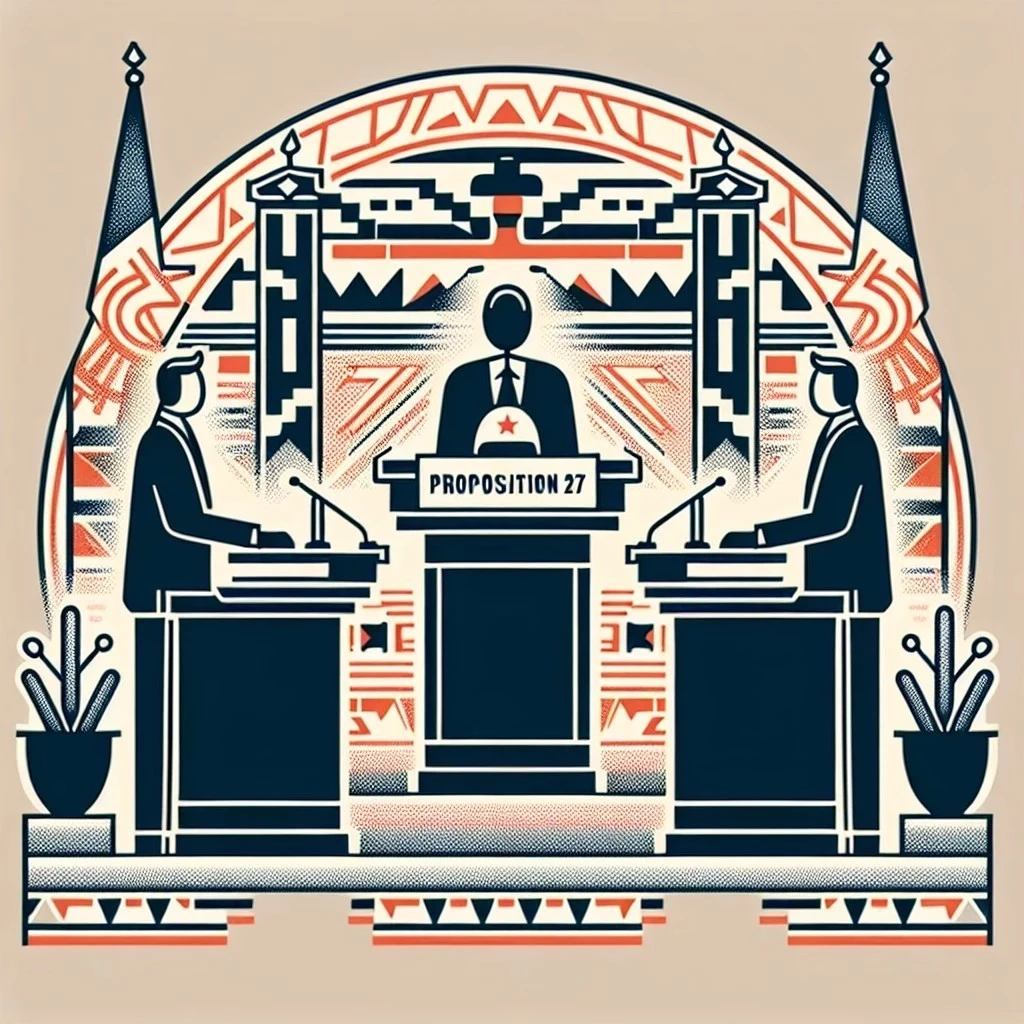Dive into the heated debate over Proposition 27 and its impact on online gaming, sports betting, and Native American tribes in California.
The Debate Over Proposition 27 and Its Impact on Native American Tribes in California
Wellcome Offer:
200% up to $2,000
+ 100 Free Spins
The winnings from your free spins will be credited as bonus funds. Exclusively available for new players with fair wagering requirements.
Wellcome Offer:
250% Bonus up to $5,000
+ 100 Free Spins
Claim your bonus and spin your way to big wins! Minimum deposit of $20 required. Wagering requirements apply. Bonus valid for 30 days.
Get up to:
100% up to $1,000
+ 300 Free Spins
You need to deposit at least $25 to be eligible for this bonus. The maximum amount of money you can withdraw from this bonus is limited to $20,000 or 10-times.
Welcome Package:
500% up to $5,000
+ 250% on your 2nd and 3rd deposits
This welcome package rewards new players across their first three deposits. A minimum deposit of $25 applies, with a wagering requirement of 60x before withdrawals.
Wellcome Offer:
250% up to $1,500
+ 100 free spins
Whether you prefer generous deposit bonuses or a bundle of free spins, Cafe Casino’s welcome offer has everything you need to enhance your gaming adventure.
Wellcome Offer:
500% bonus up to $7,500
+ 150 free spins
If you're after big deposit bonuses or a load of free spins, Ducky Luck Casino’s welcome package sets the stage for an exciting gaming adventure.
Welcome Offer:
200% up to $2,000
+ 100 Free Spins
This welcome package combines a deposit match with free spins, giving new players a powerful way to kick off their VoltageBet journey.
Wellcome Offer:
200% up to $1,000
+ 30 free spins
Lovers of slot games and those looking to boost their deposit will find Slots LV Casino’s welcome offer the perfect way to jumpstart their gaming journey.
Wellcome Offer:
200% up to $500
+ Free Spins
Terms typically include standard wagering requirements and a limited validity period. Offers vary by deposit method and player eligibility.
Wellcome Offer:
250% up to $1,500
+ 50 Free Spins
All winnings from free spins are credited as bonus funds, with fair wagering requirements. Exclusive to new players.
In recent years‚ the debate over expanding gambling in California has centered around Proposition 27‚ a contentious ballot measure that seeks to legalize online gaming and sports betting across the state. This proposal‚ however‚ has faced significant opposition from Native American tribes who are concerned about the implications for their sovereignty and economic interests.

Understanding Proposition 27
Proposition 27‚ if passed‚ would allow commercial operators to provide online sports betting services in California. The measure aims to regulate and tax online gaming‚ with the promise of generating substantial revenue sharing that could fund state programs. However‚ Native American tribes argue that this proposal undermines the economic model of tribal casinos and their rights as sovereign entities.
Tribal Sovereignty and Economic Impact
For many Native American tribes‚ casinos are a crucial source of revenue that supports community services‚ including healthcare‚ education‚ and infrastructure. The introduction of commercial online gaming poses a threat to their economic stability. Tribes argue that Proposition 27 would divert significant revenue away from tribal casinos‚ impacting their ability to fund essential services.
Legal Framework and Regulatory Issues
The legal framework surrounding gambling in California is complex‚ with tribes holding exclusive rights to operate casinos on their lands under federal law. Proposition 27 would alter this landscape by allowing commercial entities to enter the market‚ raising concerns about the potential erosion of tribal sovereignty and the regulatory challenges it may entail.
Stakeholder Interests and Political Campaigns
The debate over Proposition 27 has led to intense political campaigns from both supporters and opponents. Native American tribes have mobilized significant resources to oppose the measure‚ emphasizing their role as stewards of responsible gambling and community development. Meanwhile‚ proponents of the proposition argue that it would generate new revenue streams for the state.
Voter Sentiment and Referendum
As Californians prepare to vote on this referendum‚ voter sentiment is divided. Many voters are sympathetic to the tribes’ concerns about sovereignty and economic impact‚ while others are attracted by the potential economic benefits of legalized online sports betting.
The outcome of Proposition 27 will have significant implications for all stakeholders involved‚ from Native American tribes to commercial gaming operators and the state government. As the debate continues‚ the challenge remains to balance economic opportunities with respect for tribal sovereignty and the long-term wellbeing of all Californians.

























